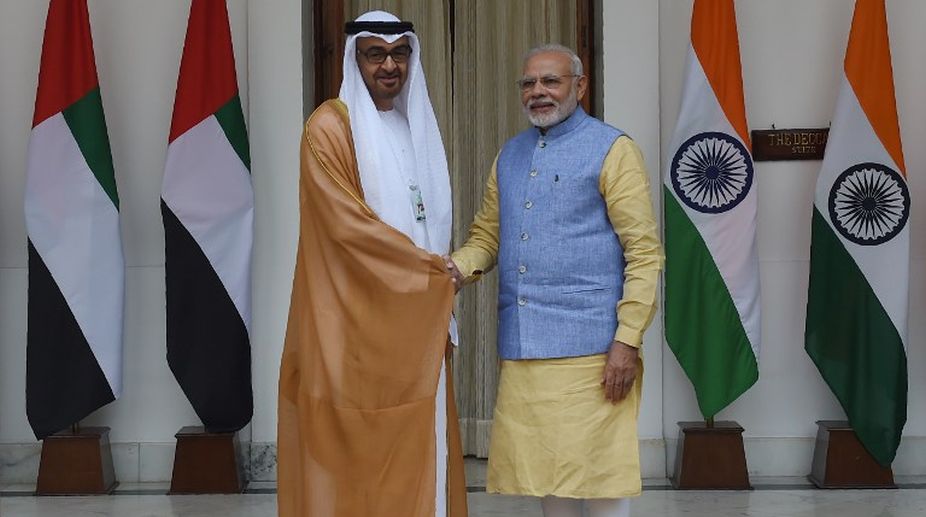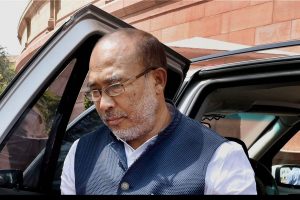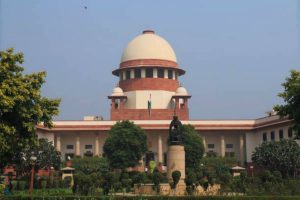The Chief Guest at the Republic Day ceremonies this year was the Crown Prince of Abu Dhabi. Though nominally only second in his country’s hierarchy, the Crown Prince has become steadily more prominent and is now regarded as the effective decision maker in his realm. His elder sibling remains formally enshrined but the effective takeover has been accomplished in a transition demonstrating dynastic continuity and the ruling family’s ability to find the most suitable person for the leadership role.
Among the Gulf states, it is Abu Dhabi that is best endowed with oil wealth and it played the leading part in the setting up of the UAE when the several small sheikhdoms of the area emerged into the uncertainties of independence. The Abu Dhabi ruler at the time was Sheikh Zayed who persuaded the various Gulf Emirates, in their own interest, to unite as a single entity, and he himself took the leading part in directing the affairs of this newly established state. The other emirates were content to follow Sheikh Zayed whose broad-minded leadership left room for each of the others to prosper and flourish in their own distinctive ways. In India, it is Dubai that has loomed largest, being more striking and ambitious in its development pattern ~ consider, for example, that it now houses the world's tallest skyscraper. But for all its relatively conservative and low-key ways, it is Abu Dhabi that has provided the underpinning of the UAE. On various occasions it has intervened to bale out one of the less fortunate partners who may have run into difficulty. Thus Sheikh Zayed’s successors have maintained his legacy as principal architect of the state.
Advertisement
One particular aspect of the story of Abu Dhabi that sets an example to others relates to the greening of the country. There is a wide swathe of vegetation along all the roads and public areas of the emirate where the desert has been induced to bloom, to the point that the land no longer looks like what it has been from the beginning, the domain of sand. Other parts of the Gulf have been similarly greened but Abu Dhabi leads all the rest. Achieving this has demanded abundant resources to bring water and topsoil to formerly barren places but more important is the vision and drive that made it possible. And the impulse came right from the top, for it was the founder himself who geared up the system to give priority to the greening of the country and to make gardens in the middle of the sand.
Compared to the contiguous emirate of Dubai, Abu Dhabi has been regarded as relatively conservative in social and educational affairs. Its restaurants and places of entertainment are more subdued, its bazars and malls less lively. But that has begun to change and Abu Dhabi is in some respects catching up with its more glitzy cousin. Generation change has something to do with it, for today’s regime is more active and less sedate. Among other innovations, it has made room for overseas branches of some famous Western universities like New York University that are now well established thousands of miles from their parent institutions. With that, and the entry of high grade academics as well as streams of new students from a wide catchment area, a different intellectual and academic environment is in the process of being created, to the benefit of Abu Dhabi and the region as a whole.
Over the years, India has developed especially close relations with the UAE and the GCC as a whole. When oil prices suddenly rose dramatically in the early 1970s, the Gulf countries became much more closely linked to India from where they drew many of the skills and much of the manpower they needed for the accelerated development now available to them. Ancient links were revived in a new form, with large numbers of workers going out from India to help develop the country where they were now domiciled, and to send back remittances that helped transform the communities from which they originated. This is a familiar tale but yet worth recounting on the occasion of the visit of the Crown Prince. The UAE as a whole, and not Abu Dhabi alone, remains a prime partner and close associate of India’s economic development. The Crown Prince’s presence in India as Chief Guest testifies to the importance of the relationship and the shared interest in advancing it further.
Recently, the UAE has become more active and has projected itself more forcefully within its region. In earlier days it kept more to itself amidst the frequent disturbances all around, contenting itself with a steady foreign policy aimed at friendly ties in all directions; within the region as a whole the biggest and most potent country Saudi Arabia was the most cautious and set the tone for others. But a more active Gulf region has now become visible, less inclined to wait on events and more ready to try to shape developments in the light of its own perceived interests. Partly this is a matter of generational change, for the former monarchs have been giving way to younger figures of a more activist bent, as is to be seen in UAE and also in its next-door neighbour Saudi Arabia. The UAE Crown Prince's burgeoning relationship with India is testimony not only to the growing bilateral friendship and economic intermeshing but also to a wider sort of regional cooperation with security and strategic overtones. As a country that has always followed a path of moderation UAE has been regarded in New Delhi as an ally in keeping under control the forces of extremism that have plagued so many other parts of the region.
The more active policy adopted in the most recent times has not been without its share of problems. Of these the most challenging is the military operation in Yemen in which UAE, in partnership with Saudi Arabia, is currently involved. The operations involve the use of some of the sophisticated military hardware acquired by these Arab states and have caused considerable damage. However, until now the military effort, which is aimed at bringing to heel the Houthi rebels of the Yemeni mountains, has remained inconclusive and continues to be a threat to the regime in Sanaa and to the region as a whole. UAE has felt compelled to develop and to use military muscle in order to meet this test. A glimpse of its new priorities was to be seen at the Republic Day parade where soldiers from Abu Dhabi marched in company with Indian counterparts, thereby inviting attention to how their country's military needs and capacity have developed.
The writer is India's former Foreign Secretary.











